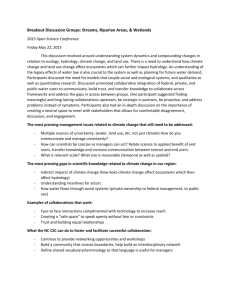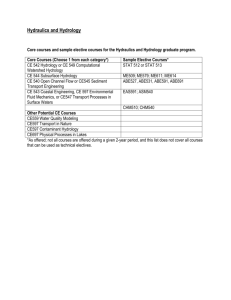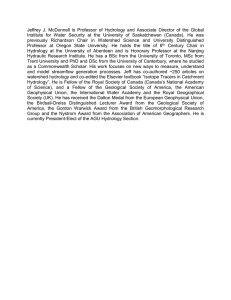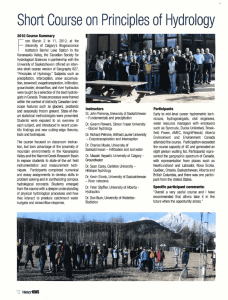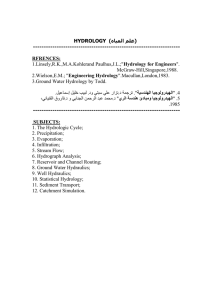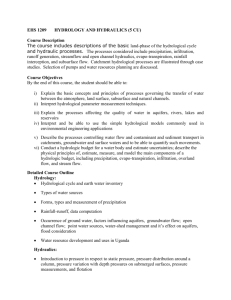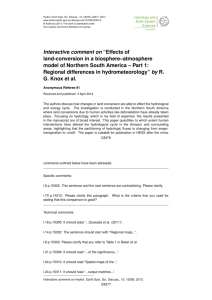Global Terrestrial Network (GTN-H) HYDROLOGY
advertisement
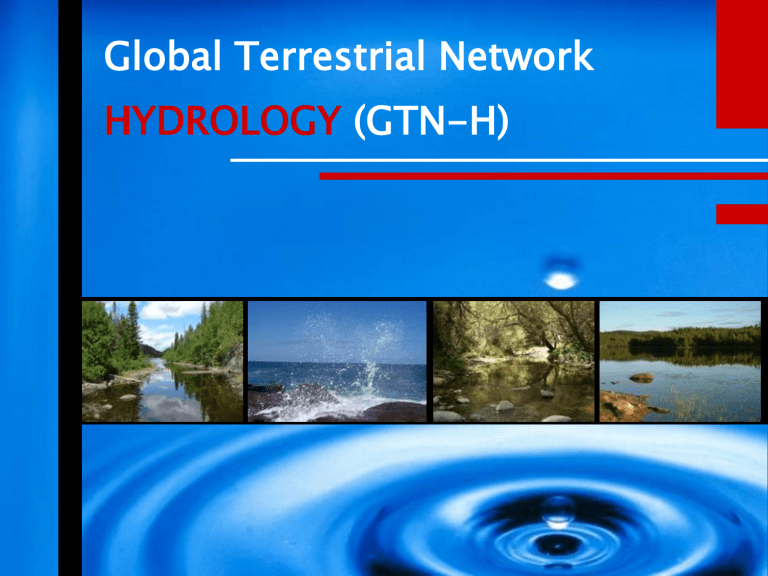
Global Terrestrial Network HYDROLOGY (GTN-H) Global Terrestrial Network - Hydrology About GTN-H ▌ Links existing networks and systems for integrated observations of the global water cycle ▌ Established in 2001 ▌ “network of networks” for global and regional climate and water applications Global Terrestrial Network - Hydrology Goals of GTN-H ▌ Aims at creating a global hydrological network of networks ▌ Plans and implements projects that facilitate access to hydrological networks and observation data, and generates derived products ▌ Forms an essential component for integrated global and regional hydrological products Global Terrestrial Network - Hydrology Main Objectives ▌ Make available data from existing global hydrological observation networks and enhance their value through integration ▌ Generation of datasets suitable for: ▬ ▬ ▬ Research in the areas of global and regional climate change Environmental monitoring, and Hydrology and water resource management Global Terrestrial Network - Hydrology International Context Joint effort of the: ▌ World Meteorological Organization/Climate and Water Department (WMO/CLW) ▌ Global Climate Observing System (GCOS) ▌ Global Terrestrial Observing System (GTOS) ▌ Observational arm of the Group on Earth Observations/ Integrated Global Water Cycle Observations Theme (GEO/IGWCO) Global Terrestrial Network - Hydrology Selected Achievements ▌ Prototype system for the online near-real time data access to over 400 river gauging stations worldwide ▌ Access to a first global gridded precipitation product ▌ First-time online access to a global water quality database ▌ Prototype definition of a hydrological metadata standard, based on the WMO core metadata standard Current Network Partners Global Terrestrial Network - Hydrology Configuration (as of November 2009) Global Terrestrial Network - Hydrology Results of the 4th GTN-H Coordination Panel Meeting New York, 7-10 July 2009 ▌ Improve communication and funding, ▌ Data integration and product development, ▌ Development of demonstration projects intended to highlight the importance of hydrological, hydrometeorological and related observations in various application areas, ▌ Aiming to demonstrate relevance of GTN-H in underpinning adaptation decisions related to climate variability and change and global environmental challenges. Global Terrestrial Network - Hydrology GTN-H Planning Workshop preceding the GTN-H Coordination Panel Meeting ▌ Presenting key examples of progress in the technical, scientific and applications realms that have developed or are using GTN-H relevant data resources, ▌ Recognizing and integrating data provider, data user, and data synthesis perspectives, ▌ Developing an initial vision of short (0-2 year), medium (2-5 year), and longer term (> 5 year) progress. Global Terrestrial Network - Hydrology GTN-H Actions 1 (selected) Database of “pristine” basins available at GRDC Clarify role of AQUASTAT as water use database with FAO; IGRAC to use gridded precipitation data as a proxy of groundwater recharge, and explore the possibility of using GRACE and soil moisture data if available. Jointly using river runoff and water quality data: new webbased flux computation Organize an expert meeting on geochemical fluxes GRDC, NSIDC collaboration in regions where glacier melt is particularly important Global Terrestrial Network - Hydrology GTN-H Actions 2 (selected) Enhance NRT collection of lakes and reservoirs data by HYDROLARE in collaboration with all partner institutions GRDC to chart a process how the metadata standard and associated technology is being promoted into other domains Trends in Runoff into the Arctic Ocean Contributions of glaciers to runoff Drought assessment – identification of drought-prone areas Identification of groundwater contributions to surface flow Use GTN-H data sets to enhance climate outlooks provided to developing countries Global Terrestrial Network - Hydrology Request to GTOS ▌ Review the validity of the Global Hierarchical Observing Strategy (GHOST): (http://www.fao.org/gtos/GHOST.html) and propose conceptual and practical ways to integrate with GTN-H observations; ▌ Participate more actively in GTN-H activities including through the joint development of relevant products Global Terrestrial Network - Hydrology Thank you for your attention Contact partners in WMO for GTN-H: wgrabs@wmo.int sbojinski@wmo.int

